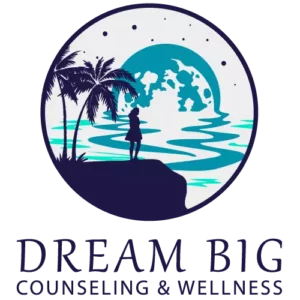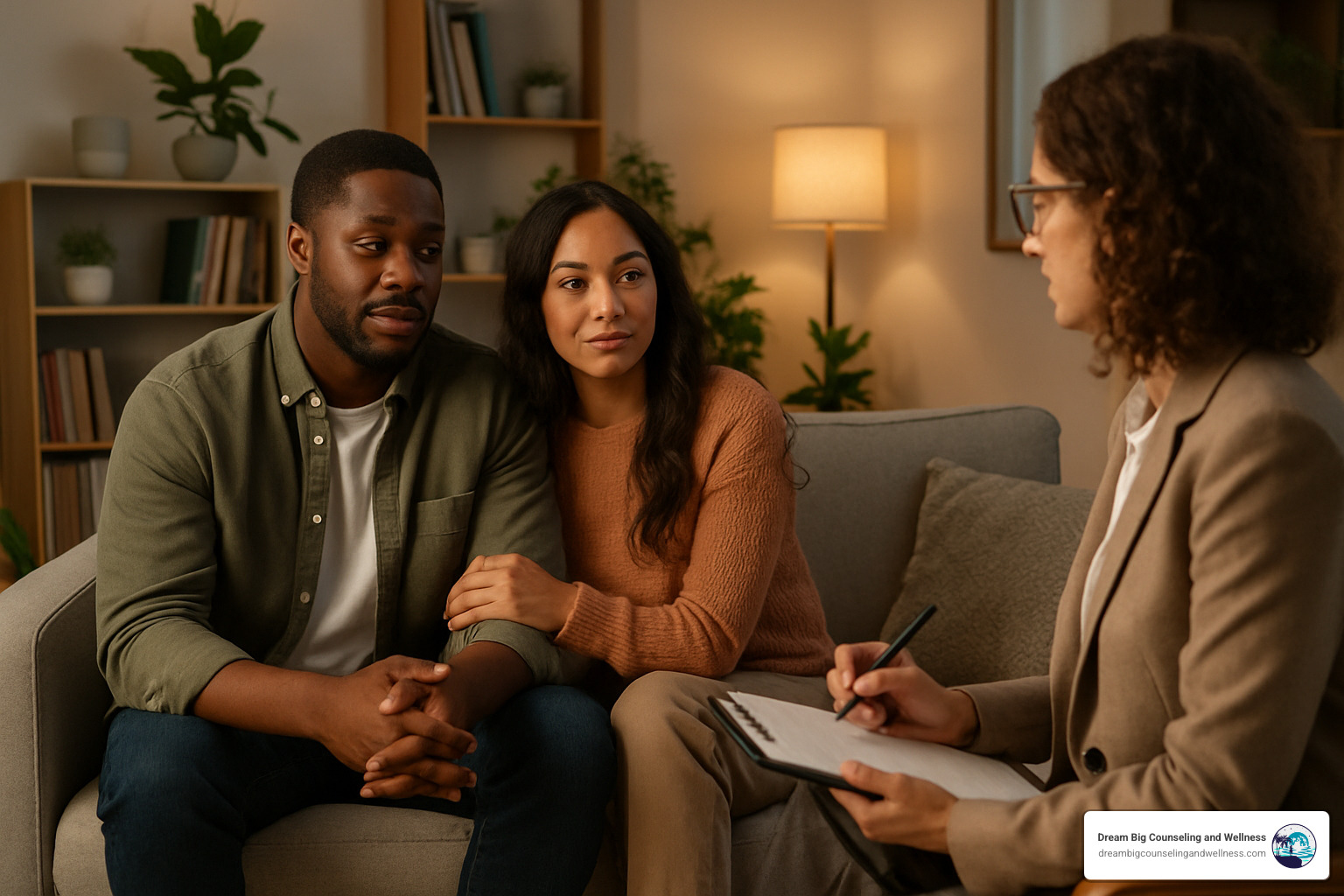Couples Therapist Near Me: 5 Powerful Solutions for 2025
Why Finding the Right Couples Therapist Near You Matters
When you search for a couples therapist near me, you’re taking a meaningful step toward strengthening your relationship. Georgetown, Texas offers personalized professional couples counseling and marriage counseling options, both in-person and online throughout Texas.
Local Couples Counseling Options in Georgetown, TX:
- Location: Georgetown, serving Round Rock, Cedar Park, Liberty Hill, and Jarrell
- Online Counseling Services: Available throughout Texas via secure video platforms
- Insurance Accepted: Aetna, Blue Cross Blue Shield, United Healthcare, Cigna, Scott & White Health Plan
- Professional Credentials: Licensed therapists with advanced training in evidence-based approaches
Whether you’re experiencing relationship problems, trust concerns, or life transitions, professional relationship counseling can help transform conflict into deeper connection. At Dream Big Counseling and Wellness, the journey toward relationship healing begins with finding couples therapists who understand your unique situation and can provide personalized care tailored to your specific needs.
Modern couples therapy and marriage counseling offer scientifically-proven approaches backed by research to rebuild intimacy, improve communication, and strengthen partnerships. The key is finding the right therapeutic relationship that can address your relationship’s distinct challenges and goals while helping you work toward a better relationship.
Understanding How Couples Counseling Works
Couples counseling focuses on helping partners develop stronger communication skills, rebuild trust, and create deeper emotional connection. Rather than simply talking through relationship problems, effective therapy involves learning specific tools and techniques that can transform how you relate to each other.
Many couples discover that counseling services provide support not just for immediate concerns but also for underlying patterns that may be affecting their marriage. This personalized approach ensures that your unique situation receives appropriate attention and care from qualified therapists who understand relationship dynamics.
Common Relationship Challenges Addressed in Marriage Counseling:
- Communication breakdowns and recurring arguments
- Trust issues and relationship betrayals
- Parenting conflicts and family dynamics
- Intimacy challenges and emotional distance
- Life transitions and major stressors
- Trauma responses affecting the relationship
- Anxiety and depression impacting the partnership
- Struggling with emotional closeness
Each couple’s journey is different, which is why personalized treatment planning becomes so important. Couples therapists will work with you to identify specific goals and develop strategies that fit your relationship’s particular needs and circumstances, helping you build a better relationship together.
Evidence-Based Therapeutic Approaches in Couples Therapy
Modern couples counseling draws from several well-researched therapeutic modalities, each offering unique benefits for different relationship challenges. The right approach depends entirely on your specific situation, goals, and what feels most comfortable for you as a couple.
The Gottman Method: Research-Based Couples Therapy
The Gottman Method couples therapy represents one of the most extensively researched approaches to relationship counseling. Developed by renowned researchers John and Julie Gottman through the Gottman Institute, this method provides couples therapists with evidence-based tools for helping partners build stronger relationships.
Gottman therapy focuses on strengthening friendship, managing conflict, and creating shared meaning in relationships. The research behind the Gottman Method involves decades of study with thousands of couples, making it one of the most scientifically-validated approaches to marriage counseling available today.
Gottman trained therapists use specific assessment tools and interventions designed to help couples gain clarity about their relationship patterns and develop practical skills for long-term success.
Emotionally Focused Therapy (EFT)
Emotionally focused therapy represents another powerful approach to couples counseling. This method helps partners identify and express their deepest emotions while creating secure emotional bonds. Emotionally focused approaches have shown remarkable success in helping couples worldwide rebuild intimacy and trust.
EFT proves particularly effective for couples struggling with emotional distance or those seeking to develop greater emotional closeness in their marriage. Research demonstrates that emotionally focused therapy creates lasting positive changes in relationship satisfaction and stability.
EMDR for Relationship Trauma
Eye Movement Desensitization and Reprocessing (EMDR) can be particularly valuable when past experiences affect your current relationship. Whether dealing with childhood trauma, previous relationship betrayals, or shared traumatic events, EMDR helps process these experiences so they don’t continue to create barriers to trust and building intimacy.
This specialized approach helps individuals work through trauma responses that may be triggered during relationship conflicts or intimate moments, allowing couples to build stronger emotional connections and support each other more effectively.
Cognitive-Behavioral Therapy (CBT)
Cognitive behavioral therapy addresses the thought patterns and behaviors that contribute to relationship difficulties. Sometimes we develop unhelpful ways of thinking about our partner’s actions or catastrophize about relationship challenges. CBT helps couples recognize these patterns and develop healthier ways of thinking and responding.
This approach proves especially beneficial for couples dealing with anxiety, depression, or mental illness concerns that impact their relationship dynamics and overall well-being.
Solution-Focused Therapy
Solution-focused therapy emphasizes building on existing relationship strengths rather than dwelling extensively on problems. Short term therapy approaches like this help couples identify what’s already working in their relationship and expand on those positive elements.
Many couples discover they have more strengths and resources than they initially realized, making this an encouraging and empowering therapeutic experience that can produce results in just a few sessions.
Attachment Therapy
Attachment therapy focuses on understanding and strengthening the emotional bonds between partners. This approach helps couples develop secure attachment patterns, improving their ability to support couples through life’s challenges and create lasting intimacy.
Understanding attachment styles can provide valuable insights into relationship patterns and help couples develop more supportive ways of connecting and building intimacy together.
Somatic Therapy
Somatic therapy recognizes that relationship stress affects your entire being—mind, body, and emotions. This body-aware approach helps couples understand how physical responses to stress impact their interactions and teaches techniques for staying regulated during difficult conversations.
Learning to recognize and manage stress responses can significantly improve how couples navigate conflicts and offer support to each other through emotional moments.
Comprehensive Counseling Services: Beyond Couples Therapy
While couples counseling remains the primary focus, many relationships benefit from understanding the broader context of family therapy and individual therapy approaches. A comprehensive therapeutic relationship often involves addressing multiple aspects of your relationship and family system.
Family Therapy and Family Counseling
Family therapy addresses the broader family dynamics that may be impacting your relationship. Whether you’re dealing with blended family challenges, parenting conflicts, or extended family stress, a family therapist can help you understand these complex dynamics.
Family counseling proves particularly valuable when relationship problems stem from broader family patterns or when couples are struggling with parenting decisions that affect their marriage. Understanding family dynamics can provide crucial insights for strengthening your partnership.
Individual Therapy Support
Sometimes one partner may benefit from individual therapy alongside couples counseling. This dual approach can be particularly helpful when dealing with trauma, anxiety, depression, or other challenges that require personalized attention while also working on the relationship.
Individual therapy can complement couples work by helping each partner address personal issues that may be affecting the relationship, creating a stronger foundation for couples counseling success.
Premarital Counseling
Premarital counseling offers engaged couples the opportunity to build a strong foundation before marriage. This proactive approach to relationship counseling helps couples develop communication skills, discuss important topics, and prepare for married life together.
Many couples find that premarital counseling provides valuable tools and insights that serve them well throughout their marriage, making it an excellent investment in their future relationship success.
Discernment Counseling
Discernment counseling serves couples who are uncertain about their relationship’s future. This specialized form of counseling helps partners gain clarity about whether to work on their marriage, pursue divorce, or take time to consider their options.
Unlike traditional couples therapy, discernment counseling focuses specifically on helping couples make informed decisions about their relationship’s direction. This short term therapy approach typically involves just a few sessions designed to provide clarity and confidence about next steps.
For couples considering divorce, discernment counseling offers a structured way to explore all options before making final decisions about their marriage.
Who Benefits from Marriage Counseling and Couples Therapy
Couples counseling serves a wide range of relationship situations and life stages. You don’t need to be struggling severely to benefit from professional support—many couples seek therapy to strengthen already good relationships or navigate upcoming life transitions.
Adults often seek couples therapy when facing career changes, financial stress, health challenges, or major life transitions. Adult relationships benefit from professional guidance during these pivotal moments, and counseling services can provide essential support during times of change.
Parents of Teens frequently find marriage counseling helpful for maintaining their relationship while navigating the challenges of parenting adolescents. The stress of teenage years can strain even strong partnerships, and therapists can offer support for maintaining connection during this demanding life phase.
Parents of Children may seek support for maintaining connection while managing the demands of family life, addressing parenting differences, or working through child-related stressors that impact their marriage.
Addressing Specific Mental Health Concerns
Couples therapy can be particularly beneficial when one partner is dealing with specific mental health challenges that affect the relationship:
Trauma responses can create unexpected triggers and reactions that strain relationships. Professional support helps couples understand trauma’s impact and develop supportive responses that promote healing and connection.
Anxiety often manifests in relationship dynamics through worry, avoidance, or seeking excessive reassurance. Treating anxiety within the context of the relationship helps couples learn effective ways to manage anxiety together while building intimacy.
Depression can affect communication, intimacy, and daily functioning. Couples learn how to support each other while maintaining their own well-being, and therapists help partners understand how depression impacts relationships.
ADHD may impact communication, organization, and follow-through on commitments. Understanding ADHD’s effects helps couples develop strategies that work for both partners and strengthen their connection.
Addiction recovery affects the entire relationship dynamic. Professional guidance helps couples navigate this complex journey while rebuilding trust and healthy patterns essential for long-term recovery and relationship success.
Georgetown Area Marriage Counseling: Personalized Care Close to Home
Georgetown offers an ideal setting for couples therapy and marriage counseling, combining small-town warmth with access to highly qualified mental health professionals. The area’s growing community creates a supportive environment for relationship healing and growth.
Dream Big Counseling and Wellness: Your Local Resource
Located in Georgetown and serving the surrounding Central Texas communities, Dream Big Counseling and Wellness provides comprehensive couples counseling and marriage counseling services with a truly personalized approach. This solo practice offers the individualized attention and continuity of care that makes such a difference in relationship work.
Comprehensive Therapeutic Approaches Available:
- EMDR for trauma processing and healing
- Cognitive-Behavioral Therapy for thought and behavior patterns
- Solution-Focused Therapy for building on strengths
- Attachment Therapy for stronger emotional bonds
- Somatic Therapy for mind-body wellness
- Marriage and Couples Counseling for relationship dynamics
The practice’s comprehensive approach means your therapy can be fully customized to address your relationship’s specific needs and challenges. Rather than using a one-size-fits-all approach, treatment plans are developed collaboratively based on your unique situation and goals, ensuring that clients receive the most effective care possible.
Research consistently shows that personalized approaches to couples counseling produce better outcomes than generic methods, making this individualized focus particularly valuable for couples seeking lasting change.
Serving Central Texas Communities
While based in Georgetown, counseling services extend to couples throughout Central Texas, including Round Rock, Cedar Park, Liberty Hill, and Jarrell. This broad service area ensures that couples across the region have access to quality therapeutic support and marriage counseling.
For couples who prefer the convenience and comfort of online counseling, secure video sessions are available throughout Texas. This flexibility allows you to access professional support regardless of your location or schedule constraints, making it easier for busy couples to prioritize their relationship.
Insurance and Accessibility
Understanding that relationship health is an important investment, the practice accepts most major insurance plans including:
- Aetna
- Blue Cross Blue Shield
- United Healthcare
- Cigna
- Scott & White Health Plan
Insurance coverage makes professional couples therapy and marriage counseling accessible to more Georgetown area couples, removing financial barriers to getting the support your relationship deserves. Many insurance plans cover marriage counseling when deemed medically necessary for relationship distress.
Online vs. In-Person Counseling Options
The choice between online and in-person therapy often comes down to personal preference, schedule considerations, and what feels most comfortable for your relationship.
Benefits of In-Person Marriage Counseling
Meeting in a professional office setting creates a dedicated space for your relationship work. Many couples appreciate the ritual of “going to counseling together” as it provides clear boundaries between everyday life and therapeutic work. The face-to-face interaction can feel natural and immediate, and some couples find that being in a private practice setting enhances their focus on the therapeutic relationship.
Advantages of Online Couples Counseling
Online counseling offers significant flexibility and convenience. You can attend sessions from your own home, eliminating travel time and the need to arrange childcare. Many couples find they’re more relaxed and open in their familiar environment, which can actually enhance the therapeutic process and support better relationship outcomes.
Both formats prove equally effective for couples work according to research, so the decision really comes down to your personal preferences and practical considerations.
Preparing for Your Couples Counseling Journey
Starting couples therapy represents a significant commitment to your relationship’s growth and healing. A little preparation can help you feel more confident and get the most value from your therapeutic investment.
Before Your First Session
You’ll likely receive intake forms to complete before your initial appointment. These forms provide your therapist with important background information about your relationship history, current challenges, and goals for counseling. Taking time to thoughtfully complete these forms helps couples therapists understand your situation before you even meet.
Spend some time with your partner discussing what you both hope to achieve through marriage counseling. Having shared goals creates a foundation for your therapeutic work together and helps ensure that both partners feel invested in the process.
Goal Setting and Expectations
Effective couples counseling begins with clear goal setting. Maybe you want to improve communication after years of misunderstandings, rebuild trust after a difficult period, or simply strengthen an already good relationship. Having specific, realistic goals helps guide your therapeutic journey and creates benchmarks for measuring progress.
Your therapist will help you develop these goals collaboratively, ensuring both partners feel heard and that expectations remain realistic and achievable. This process often helps couples gain clarity about what they truly want from their relationship.
What Happens in Your First Session
Your initial session focuses on getting to know your relationship story—how you met, what brought you together, challenges you’ve faced, and what motivated you to seek counseling now. Couples therapists aren’t looking for one “correct” version of events but rather want to understand how you each experience your partnership.
This first session establishes the foundation for your therapeutic relationship and begins the process of identifying patterns and developing treatment goals. Many couples find that even this first session provides valuable insights and hope for their relationship’s future.
Maximizing Your Counseling Investment
Getting the most from couples therapy requires active participation and commitment from both partners. Counseling works best when both people feel safe sharing honestly, even when those conversations feel difficult or uncomfortable.
Between-Session Practice
Much of therapy’s benefit comes from practicing new skills between sessions. Your therapist may suggest specific communication techniques to try at home or exercises designed to strengthen your emotional connection. Couples who consistently practice these skills typically see faster and more lasting progress in building intimacy and improving their relationship.
Research demonstrates that couples who actively engage in homework assignments and practice new skills outside of sessions achieve better relationship outcomes than those who only engage during appointments.
Consistency and Commitment
Regular attendance makes a tremendous difference in therapeutic outcomes. While it might be tempting to skip sessions when things are going well, consistent appointments help maintain momentum and prevent old patterns from returning. This consistency is particularly important when working toward long-term relationship goals.
Many therapists recommend weekly sessions initially, with the frequency potentially decreasing as couples develop stronger skills and see improvement in their relationship satisfaction.
Frequently Asked Questions About Marriage Counseling
How long does couples counseling usually take?
The length of couples therapy varies significantly based on your specific goals and challenges. Some couples notice meaningful improvements within just a few sessions, especially when working on specific communication skills or addressing particular concerns through short term therapy approaches.
More complex situations involving trauma, trust rebuilding, or significant life transitions may require several months of consistent work. Your therapist will discuss realistic timelines based on your particular situation and goals, helping you understand what to expect from the counseling process.
Will insurance cover our marriage counseling sessions?
Most major insurance plans provide coverage for couples therapy when working with licensed professionals. Coverage details vary by plan, so it’s helpful to contact your insurance provider to understand your specific benefits, copay amounts, and any session limits that may apply.
Many insurance plans cover marriage counseling when it’s deemed medically necessary for addressing relationship distress or mental health concerns affecting the relationship.
What if one partner is reluctant to attend counseling?
It’s common for one partner to be more eager for therapy than the other. Focus on positive potential outcomes rather than dwelling on relationship problems. Explain that you want to strengthen your connection and improve communication together, emphasizing the benefits of working toward a better relationship.
If your partner remains hesitant, individual therapy can still create positive changes in your relationship dynamics. Sometimes seeing positive changes in one partner encourages the other to become more open to couples counseling.
How do we choose between online and in-person sessions?
Both formats are equally effective for couples work according to research. Consider your schedules, comfort with technology, preference for face-to-face interaction, and practical factors like travel time and childcare needs. Your therapist can help you decide which format might work best for your situation and relationship goals.
What’s the difference between couples therapy and marriage counseling?
The terms “couples therapy,” “couples counseling,” and “marriage counseling” are often used interchangeably. All refer to professional therapeutic services designed to help couples improve their relationships, develop better communication skills, and work through challenges together.
The specific approach may vary depending on the therapist’s training and your particular needs, but the goal remains the same: helping you build a stronger, more satisfying relationship.
Taking the Next Step in Your Relationship Journey
Searching for a couples therapist near me in Georgetown represents one of the most meaningful investments you can make in your relationship’s future. Whether you’re facing specific challenges or simply want to strengthen your connection, professional counseling services can provide the tools and insights needed for lasting positive change.
Georgetown’s therapeutic resources, combined with the personalized care available through Dream Big Counseling and Wellness, offer couples throughout Central Texas access to quality relationship support. The practice’s comprehensive approach, insurance acceptance, and flexible service options make professional couples therapy and marriage counseling accessible and convenient.
Your relationship deserves the same attention and care you give to other important aspects of life. Professional couples counseling provides evidence-based tools and strategies backed by research that can benefit relationships at any stage, from newlyweds building a strong foundation to long-term couples working through recent challenges.
The therapeutic modalities available—including EMDR for trauma processing, CBT for thought and behavior patterns, Solution-Focused Therapy for building on strengths, Attachment Therapy for emotional connection, and Somatic Therapy for mind-body wellness—ensure that your care can be truly customized to your relationship’s unique needs.
Whether you’re interested in traditional couples therapy, marriage counseling, family therapy, premarital counseling, or discernment counseling, qualified therapists are available to support your journey. The flexibility of both in-person and online counseling services means you can access support in the format that works best for your life and relationship.
Taking this step demonstrates wisdom and commitment to your partnership’s future. The strongest relationships often belong to couples who recognize when they could benefit from professional guidance and take action to get the support they need. Research consistently shows that couples who seek professional help develop stronger communication skills, greater intimacy, and more satisfying long-term relationships.
Many couples find that counseling not only helps them resolve immediate concerns but also provides tools and insights that continue to benefit their relationship for years to come. The investment in professional support often pays dividends in increased relationship satisfaction, better communication, and a deeper sense of connection and intimacy.
Ready to strengthen your relationship and work toward a better relationship together? Contact Dream Big Counseling and Wellness to learn how personalized couples counseling and marriage counseling can be tailored to your specific needs and goals. Your journey toward a stronger, more fulfilling partnership begins with reaching out for the professional support your relationship deserves.





